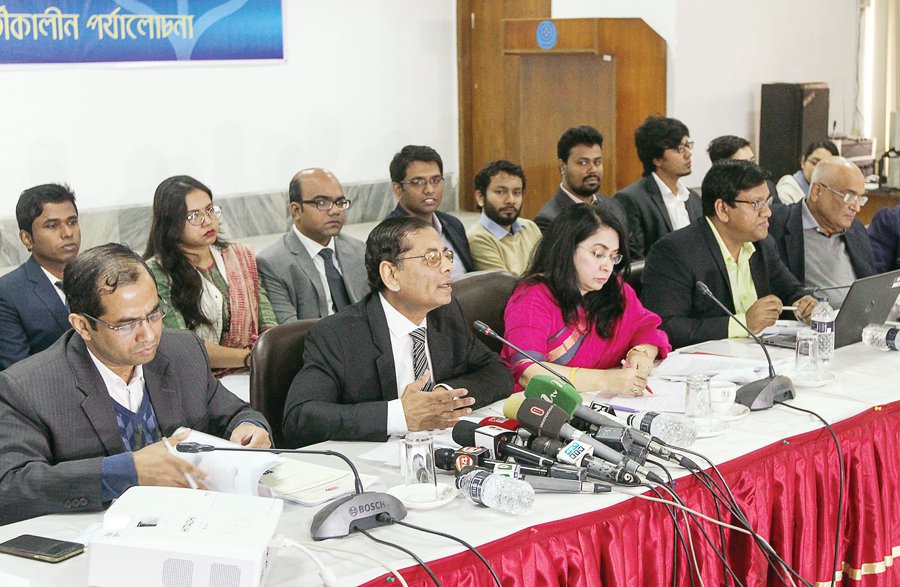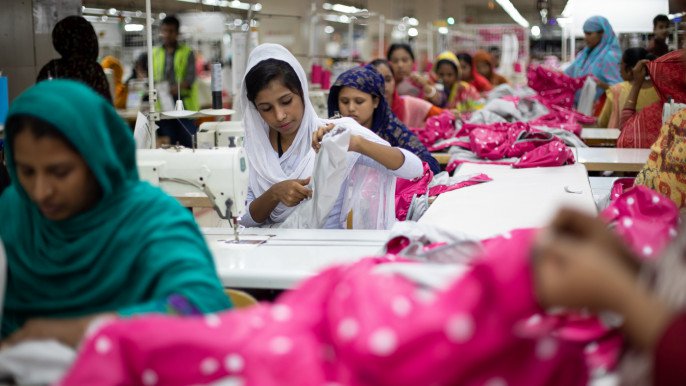Published in Dhaka Tribune on January 14, 2018

‘It is very obvious that financial discrimination is increasing in the country and it is proven that this discrimination will hit sustainable growth’
A leading economic think tank has called on the government to maintain conservative economic management in 2018, its last year in office before national polls, to maintain a minimum economic growth.
Speakers at the release of a report – State of the Bangladesh Economy in FY2017-18 (First Reading) – organized by Centre for Policy Dialogue (CPD), warned that a traditional pre-election government spending spree would further endanger an already risky economic scenario.
CPD prepared the interim reviews report of the fiscal economy as part of its Independent Review of Bangladesh’s Development (IRBD) program.
CPD Fellow Prof Mustafizur Rahman said: “Before the election it is a common practice in the country that the government loses its appetite to reform anything, makes extra expenditure keeping public attention in focus and political instability increases in the country.”
With this weak condition of the economy, political instability could make the situation worse, and therefore the government should adopt conservative economic management, he argued.
Speakers in the program said the year 2017 had a promising start but the government could not maintain it, and as a result the end was not pleasant for either the country or the government.
CPD Fellow Dr Debapriya Bhattacharya said now that the government has only one year before the election, one of the concerns is that in keeping with the prevailing culture, it would increase allocation, increase numbers of projects with minimum allocation, lump allocations and such.
“Considering the current economic situation, it can certainly be said that the government will not go for a radical change in this year,” he added.
He blamed the lack of effort to reform structure, lack of coordination among the government financial organizations and attempts to build coordination, and finally the weakness of the Finance Ministry to take decisions and implement them and said the government should maintain conservative economic management in 2018.
The government should establish control in loan issuance, inflation, increase revenue sources along with increasing the collection of personal VAT, decrease foreign exchange and make rational government spending of allocated money, Debapriya said.
CPD Research Fellow Towfiqul Islam Khan reviewed performances in major economic sectors as public finance, inflation and monetary sector and external sector.
Quoting Bangladesh Bureau of statistics, he said considering the base year of 2005-06, the highest ever GDP growth (7.28%) was achieved in FY2017. This was 0.17% point increase from FY2016 that exceeded the planned target of 7.2% for a second successive fiscal year.
“The growth was primarily driven by an increased contribution from the services sector
In particular, from the wholesale and retail trades sector. Contribution from financial intermediations also improved substantially despite deteriorating performance of the banking sector,” he added.
Quoting QIIP data he said leather and related products (53.4%), textile (21.2%), pharmaceuticals and medicinal chemical manufacturer (32.1%), and manufacture of other non-metallic mineral products (32.3%) experienced significant growth. But this high growth recorded by large-scale industries failed to get reflected in the export figures.
Export earnings registered only 1.7% growth in FY2017. In particular RMG exports posted only 0.2% growth, while leather and leather products grew by 6.3%.
Besides, they addressed crisis in the banking sector, flood damage and post-flood management and Rohingya crisis as major concerns for Bangladesh in 2018.
‘Move forward to qualitative measurement in GDP’
CPD researcher Towfiqul Islam said Bangladesh GDP is highly focused on GDP growth rate.
“But time has come to give focus on qualitative measurement in GDP for sustainable growth,” he said.
“The country is experiencing reduction of extreme poverty but the rate of reduction has been slowing down for the last couple of years.”
The report said national poverty reduction rate has declined to 1.2% per annum. The percentage was 1.8 for the 2000-05 and 1.7 for 2005-10 periods.
The share of income of the lowest 5% households has dropped down to 0.23% in 2016 from 0.78% in 2010. In contrast, the income share of the top 5% households has gone up to 27.89% in 2016 from 24.61% in 2010.
Debapriya Bhattacharya said the country is continuing its growth for last decade but nothing has been done to maintain sustainable growth.
“No increase of source of employment, poverty reduction rate went down, personal investment did not increase in the expected way and imports increased throughout the year,” he said.
“It is very obvious that financial discrimination is increasing in the country and it is proven that this discrimination will hit sustainable growth,” he added.
Prof Mustafizur said the country needs to concentrate on creating more decent jobs. According to Labour Force Survey (2013 – 2016) 900,000 decent jobs decreased in the manufacturing sectors.
Replying to a question he said RMG export has seen less growth but cotton import has increased.
“One cannot say for sure if money laundering is taking place under the cover of cotton import. But there is a fear that it might be happening as the quantity of the RMG export growth is lower. Importers most of the time use under-invoicing to abuse tariff facilities.”
The researcher said that the government should increase monitoring on these issues.
Research Director of the CPD Khondaker Golam Moazzem said the Pay Commission should sit to adjust the minimum wage and they should keep in mind that the wage board they are making should reflect its purpose.
“At the lowest scale, people are spending 50-60% of their income for food,” he said.
Prof Mustafizur said in our neighbouring country it has been seen that the external inflation was increased when the food inflation is increasing in the country. But Bangladesh is the only country where the government data shows the reverse.
“We are in doubt over government provided statistics,” he added.
Researchers Towfiqul Islam Khan said government should continuing importing food.
He said the recommendations they had given earlier to the government to take sustainable measures over Haor areas.
His presentation recommended that rebuilding and repairing of embankments and dams in coordinated manner, introducing integrated flood management framework, and ensuring remedied structural flaws of communication networks in many rural areas that cause water logging.
2017 a scandalous year for the banking sector
Towfiqul Islam Khan during his presentation said the banking sector has been plagued by financial scams, non-performing loans, inefficiency, slack monitoring and supervision in 2017.
“In the meantime the government is preparing to give new licences to more banks, which would be another destructive decision as all the new banks that got licence in recent years are in poor condition,” he said.
Dr Debapriya said 2017 would be marked as scandalous year for banking sector.
“And there is no sign of solving the problems in 2018. Instead of taking sustainable measure government has done the opposite. Their proposal in Banking Company Act is widening the space for family control over bank governance.”
Dr Fahmida Khatun, executive director of CPD, said cronyism in the bank is helping the family and friends become more rich.
The government has spent Tk15,705 crore in recapitalising the banks during the period FY2009-FY2017. This amount is roughly half the cost of the construction of the Padma Bridge. Instead of the government-funded recapitalisation, banks should use revenue to increase capital or search for investors to buy bank shares or merge with other commercial banks, Towfiq suggested.
Rohingya Repatriation could need 12 years if process slows down
Towfiq said the country would face several challenges due to the unfolding crisis of the Rohingya influx. These will have three dimensions- economic, social and environmental.
The environmental loss would be one of the major losses. Around 6,000 acres of land was deforested by the Rohingya camps and according to CPD estimates, this is equivalent to Tk741.3 crore or US$86.7mn.
According to OCHA and UNHCR, total fund requirement for the September 2017 – February 2018 would be $517.8 million (US$434m+US$83.8m additional funds). CPD estimated that US$882 million will be required for the period September 2017 – June 2018, the presentation said.
“It is very natural that the rate of Rohingya Repatriation will slow down with time and if it slows down to 200 persons a day instead of 300 persons a day, it would take 12 years and would cost $6bn,” he said.
He said the estimation did not include relocation or new establishment expenditure.
He urged the government to initiate more effective measures so that the Rohingya repatriation process would not be harmed and the support from international community would continue.
Otherwise the government would have to bear the cost and with this weak condition of economy it would be a tough task, he added.
 CPD RMG Study Stitching a better future for Bangladesh
CPD RMG Study Stitching a better future for Bangladesh





